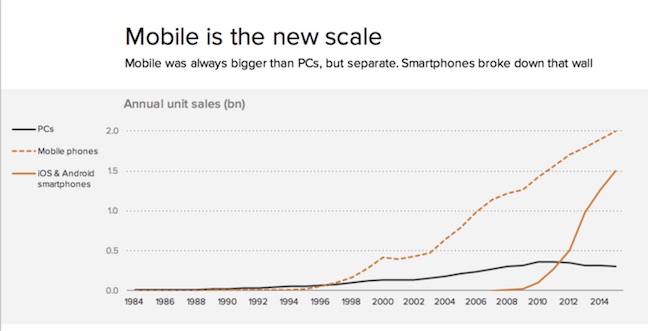This article is more than 1 year old
Let's praise Surface, not bury it
The PC is dying, but better, richer apps might just save it
Comment Yes, I know the new Surface kit unveiled by Microsoft (hands-on and roundup) is both lavishly over-engineered and ludicrously expensive. You know that. We all know that.
But that's not the point. The Surface extravaganza is a good thing. Faced with a mortal threat, Microsoft is doing something it should have done years ago – and is trying to make people love (and use) that lump of plastic in the corner of the living room by the telly.
A decade into the "post-PC" era, the Wintel personal computer is entering its twilight years, with the very real prospect that it will up become the Betamax of computers. And I choose that analogy quite carefully. After it lost the format wars, Betamax lived on for decades in linear editing – eventually giving way to digital editing suites (but not at the BBC).
The PC will surely be around in enterprises for a long time yet.
But the decline is long and inexorable, and getting more ominous. Last year, PC sales fell 8 per cent, according to Gartner. Note two things. Significantly, there was an even steeper fall in the Christmas quarter, which Gartner interpreted as "hinting at changes to consumers' PC purchase behaviour". "Consumers' interest shifted to other consumer electronics devices such as TVs and wearables," the firm dryly noted.
The other thing to keep in mind is something you’ll already know – volumes. Fewer than 300m PCs (288.7m according to Gartner) shipped last year and soon ARM phones and tablets will be outselling PCs 10 to 1.
You can do plenty of "content creation" on a Samsung Galaxy phone – Samsung even has its own competitor to Garageband for Android. It's very good, but fiddly on a phone... and Apple always makes IO difficult. So why not a PC?
So Surface is an attempt to revive interest in the very idea of personal computing. It's had a hugely positive impact on the quality of the established PC players. Lenovo, Dell and HP have all gone back to the drawing board and returned with their best products for years.
For my money these are much better value, and more practical than the Surface concepts – although arguably the XPS 13 and the Yogas have had a significant impact on the public consciousness. But at least people can argue over which upmarket PC to get now, and that wasn’t something they were doing before – if ever.
In the past, it was always software that fuelled hardware sales, and Microsoft has remembered this. Lotus 1-2-3 compelled businesses to buy a PC in the 1980s, as did the free music on tap available through the original (unlicensed and unethical) P2P Napster. The latter was arguably the only piece of software that genuinely drove consumer PC demand.
And Microsoft has focussed on creativity that a large display facilitates. Leaving aside Nadella's tortuous interpretation (the CEO bafflingly quoted from a letter by Rilke about bereavement), it's a smart move. The small screen size of phablets mean a more powerful, capable device is more appropriate for creative software. And it's quite brave too, taking on a complacent Apple on its home turf. And why should Apple have all the best tunes? iMovie and Garageband, bundled with every iPad and Mac, have had the field to themselves for a long time, unchallenged.
It's a long shot, but if we see an explosion of thoughtfully designed creative software, perhaps companies will start to think about entering the PC market, rather than quitting it. ®

